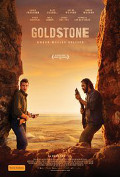
Directed by
Ivan Sen
110 minutes
Rated M
Reviewed by
Bernard Hemingway

Goldstone
Synopsis: Indigenous Detective Jay Swan (Aaron Pedersen) arrives in the remote Queensland mining town of Goldstone on a missing persons case and uncovers a nest of corruption
Writer-director Ivan Sen’s sequel of sorts to his successful 2013 film Mystery Road is so indebted to the noir thriller in general and in particular the classic Chinatown that one almost wants someone to say to its laconically brooding hero, “Forget about it Jay. It’s the Outback”.
Over-doing the taciturnity somewhat Pedersen’s detective is far less self-possessed than his previous incarnation. Grieving the death of a teenage daughter, he’s now scruffy, lank-haired and with a serious drinking problem. But he’s also determined to discover the whereabouts of a missing Chinese girl, one of the many sex-workers regularly imported to serve the mining town’s brothel. As Jay indefatigably goes about his search gradually the sole resident cop (Alex Russell) realizes that he has tacitly been a part of something rotten and begins to get involved with his own investigation..
The fatalistic tone, the destruction of innocence, the venality and corruption, the presence of cheap sex and even cheaper death, elements familiar from the noir thriller, are all here. The only difference is that “here” is not the mean streets of Los Angeles but the blinding, scorched expanse of the Australian Outback, superbly lensed by Sens himself, and at stake is not the Californian orange groves but the sacred lands of the original inhabitants that the gold mining company, in the guise of its smarmy Anglo-Australian manager (David Wenham), wants to exploit.
Sens takes his time to play out his narrative, paying as much attention to its setting as he does to the crime-solving business (the presence of David Gulpilil and Tom E. Lewis, the latter from The Chant of Jimmie Blacksmith cannily ties the film into the now considerable history of Australian film dealing with black-white relations, always an important theme in the director's films). In many ways this is where the value of the film lies, in watching the seamless way in which the crime story genre template is transposed to our wide, brown land (although at times the stunning overhead visuals feel somewhat unmotivated).
Its weakest aspects are when it tries to conform too closely to genre conventions. Jacki Weaver has played the crime matriarch too many times for it not to be an unfortunate cliché and the suggestion of her dalliance with Wenham’s Ray Barrett-like manager borders on the ridiculous. Even more ill-judged is a clumsily-handled American-style shoot-out at the film’s end that feels like a pointless attempt to up the action quotient.
Yet despite its shortcomings Goldstone is an impressively ambitious film with Sen yet again demonstrating that he is one of Australia’s most gifted film-makers.

Want more about this film?


Want something different?




